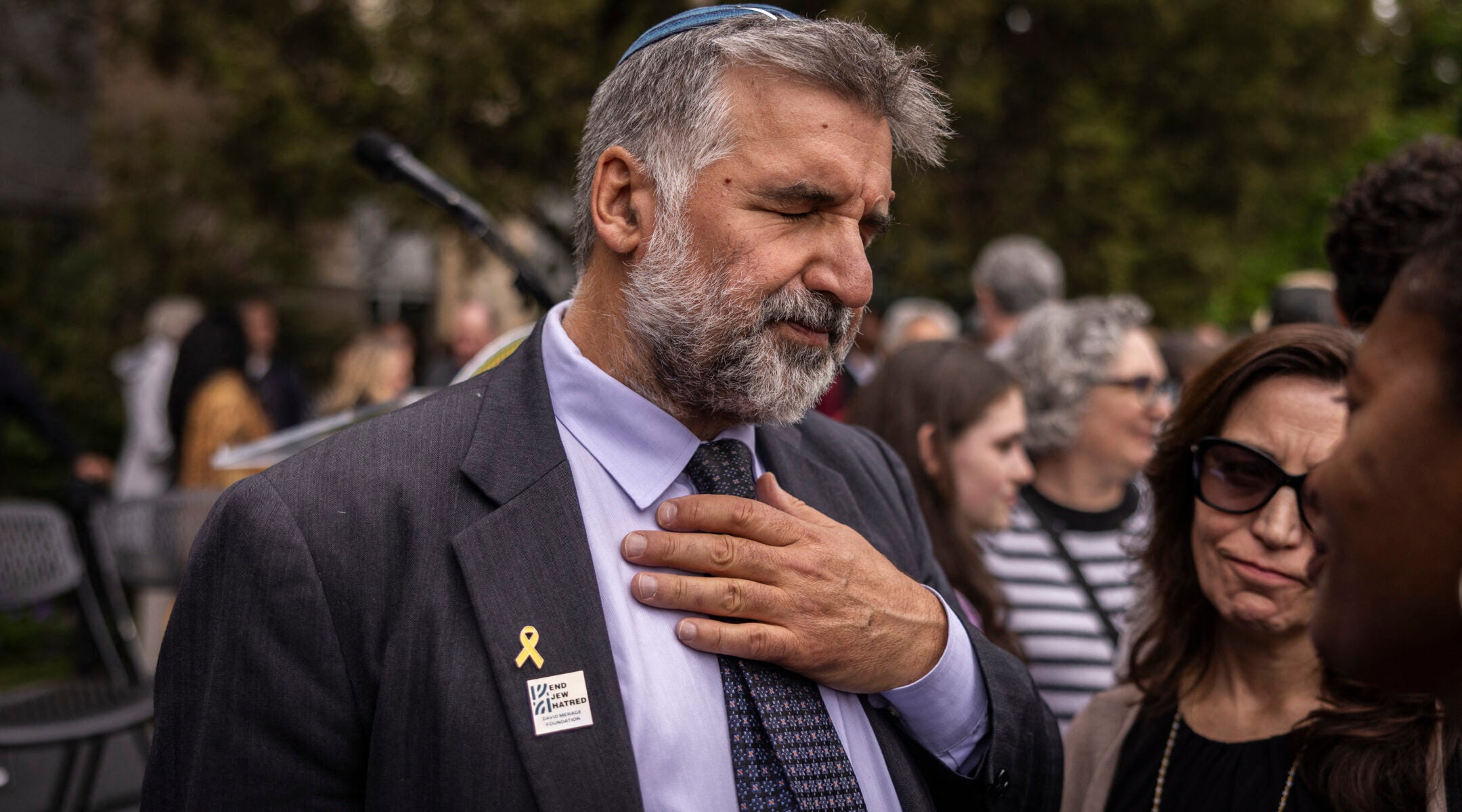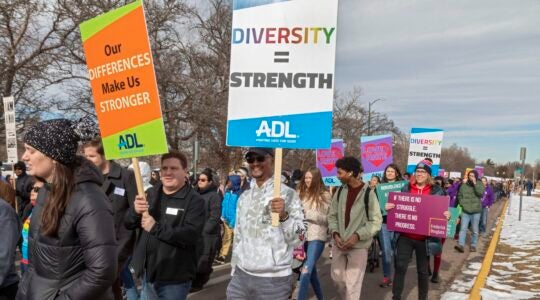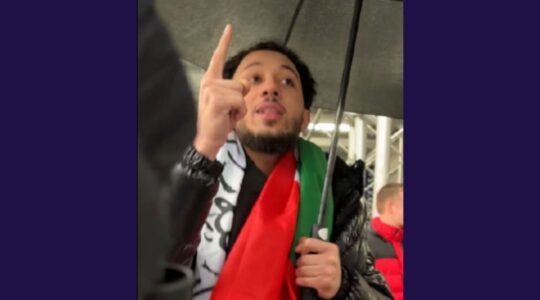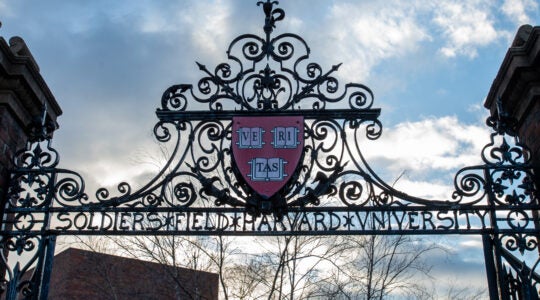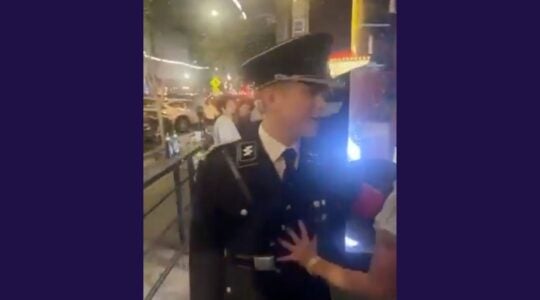Three days after six of his congregants were burned by a man who yelled “Free Palestine” as he threw Molotov cocktails, Rabbi Marc Soloway said his Jewish community remained “very shocked and very traumatized.”
Soloway, who helms Congregation Bonai Shalom in Boulder, Colorado, rushed to the hospital after learning about the attack. He often attended the Run for Their Lives, a weekly rally to call attention to the Israeli hostages still being held in Gaza, in downtown Boulder but had skipped it on Sunday to prepare for the Shavuot holiday that began at sundown and lasted until Tuesday night.
Celebrations planned for the holiday gave way to comforting the injured, consoling the traumatized and becoming a voice and face for a community in crisis.
“It’s been brutal, agonizing, just shocking, unbelievable, just so many emotions, a lot of grief and pain and sadness, and also quite significant amounts of anger and just trauma,” Soloway said in an interview with the Jewish Telegraphic Agency on Wednesday afternoon.
He said that the fact such an attack could take place in 2025 in Boulder is “incomprehensible.”
Fifteen people between the ages of 25 and 88, as well as one dog, were injured during the attack Sunday, officials said on Wednesday after learning about more people who had been hurt but not hospitalized.
“This was someone who was literally setting fire to Jewish bodies. It’s just the most horrific thing to imagine,” Soloway said. “There were literally Jewish bodies lying on the ground in flames, and it was a pure hate attack, pure act of terrorism, pure antisemitic attack.”
On Wednesday evening, a crowd filled the Boulder Jewish Community Center for a community gathering that included testimonials from people who participated in Sunday’s march and witnessed or were injured in the attack, songs and poems, and a prayer for the healing of those injured.
“We know that resilience, strength and pride is who we are as Coloradans, as Boulder County residents and as Jews,” said Colorado Gov. Jared Polis, who is a member of Boulder’s Jewish community. Earlier on Wednesday, Polis had hosted an interfaith gathering at the site of the attack on the Pearl Street Mall.
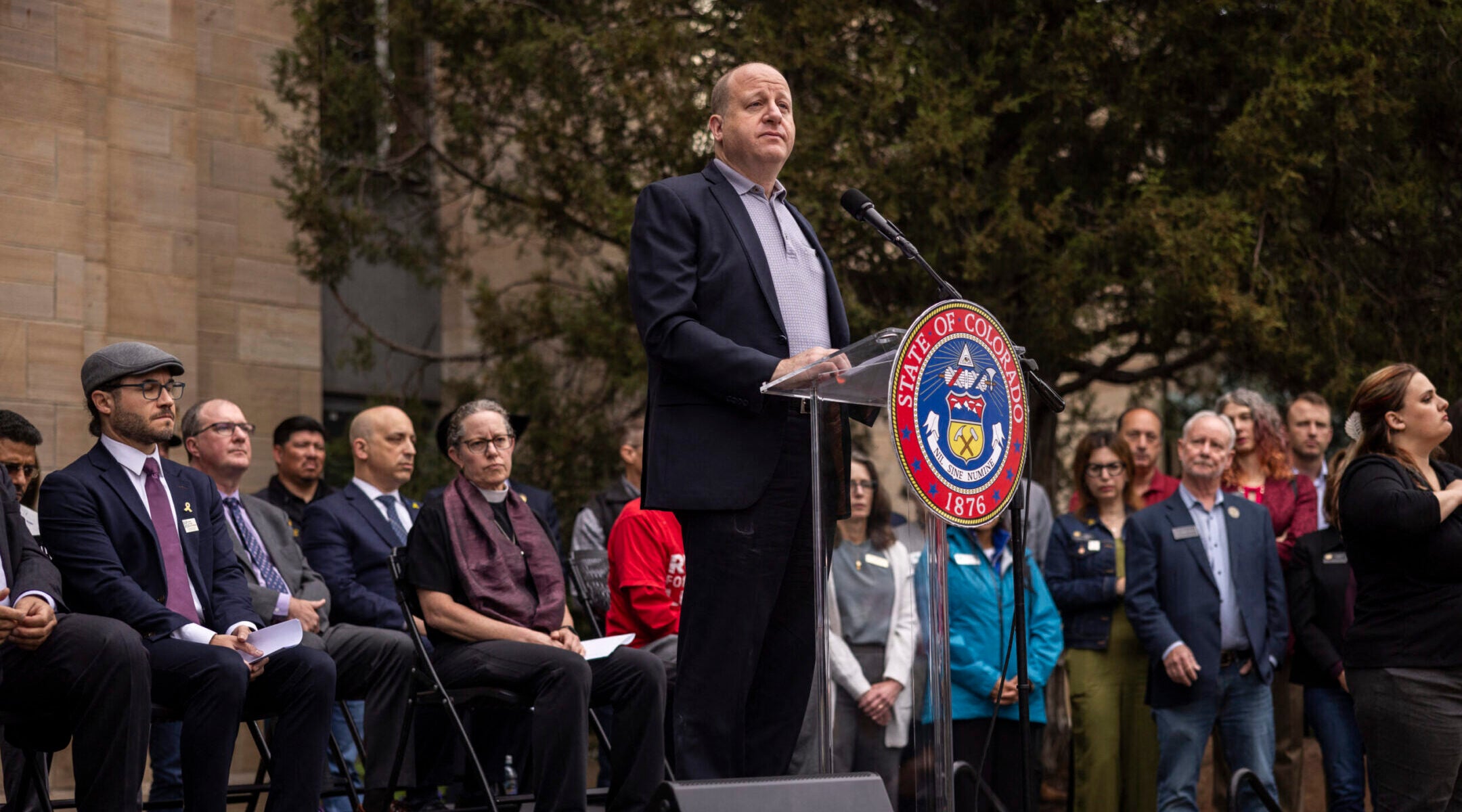
Colorado Gov. Jared Polis speaks during a community gathering at the site of an attack against a group holding a vigil for Israeli hostages in Gaza in Boulder, Colorado, June 4, 2025.(Chet Strange / AFP via Getty Images)
Several local rabbis appeared at both events, many noting that the community had shown remarkable strength in the wake of the attack. “There’s been an outpouring of love and support from within the Jewish community, but there’s also been a tremendous outpouring of love from outside the Jewish community,” Soloway said on stage.
He also led the crowd in reciting a maxim of Rabbi Zalman Schachter-Shalomi, the founder Renewal Judaism who spent the last two decades of his life in Boulder. “The only way to get it together is…” he said, pausing to allow attendees to end the sentence in unison: “Together!”
Ahead of the event, Soloway said the attack had compounded feelings of isolation that many in Boulder’s Jewish community have felt over the last year and a half, during the Israel-Hamas war. City Council meetings in the largely progressive city have been so swamped by pro-Palestinian activists seeking to speak and demand a ceasefire resolution that the council adopted new rules and moved many meetings online.
“Most of us in the Jewish community here in Boulder have been very progressive and aligned and partnered with a lot of progressive people. And now some of the worst hateful rhetoric is coming from the far left, not the far right,” said Soloway. “It’s very confusing and hurtful. There’s a sense of betrayal.”
On Monday night, the City of Boulder issued a statement acknowledging that the firebombing was a “targeted, antisemitic attack.”
One City Council member, Taishya Adams, refused to sign the acknowledgement, telling the Boulder Reporting Lab that she wanted the attack to be characterized as “anti-Zionist” instead.
Soloway said Adams’ decision not to sign the letter felt “incredibly painful” to him and others in the community.

Members of the Boulder, Colorado, Jewish community gathered in the wake of an attack on local Jews calling for attention to Israeli hostages in Gaza, June 4, 2025. (Screenshot)
“This isn’t the time to sort of be analytical about the difference between antisemitism and anti-Zionism. We just need to name it for what it is,” Soloway said. “It was a very deliberate targeted attack, someone who wanted to kill Jews and he wanted, literally, to burn them to death with these homemade incendiary devices that were just primitive and awful.”
Among Soloway’s congregants to be injured in the attack was Barbara Steinmetz, an 88-year-old Holocaust survivor who has become one of the most poignant symbols of the attack. Soloway declined to speak about Steinmetz or any of his other congregants to JTA.
In an interview with NBC News Tuesday, Steinmetz said she “wants people to be nice and decent to each other, kind, respectful, encompassing” after being asked what she wants Americans to know following the attack.
“We’re Americans,” she continued. “We are better than this. That’s what I want them to know. That they be kind and decent human beings.”
Steinmetz was born in Gyor, Hungary, on Nov. 26, 1936, as the second of two children in an Orthodox Jewish family. Her family operated a hotel on the island Lussinpiccolo off the coast of Croatia which at the time belonged to Italy, according to a talk Steinmetz gave to CU Boulder students for Holocaust Remembrance Week in 2019.
Her family remained in Italy until 1939, when the Italian Racial Laws barred Jews from certain jobs and ordered Jewish property and businesses to be confiscated.
Steinmetz’s family fled in 1940 to Southern France, and eventually made their way to Lisbon, Portugal, where they obtained visas for the Dominican Republic — one of the few countries at the time that accepted Jewish refugees.
In 1941, when Steinmetz was 4 years old, her family left mainland Europe and settled in the Dominican Republic before eventually securing visas for the United States with the help of relatives in 1945, according to another talk Steinmetz gave at CU Boulder in March.
Steinmetz shared her family’s story with the USC Shoah Foundation in an interview in 1998. In Boulder, she has spoken at synagogues and schools about the Holocaust and her family’s escape, her friend Chany Scheiner told the Denver television station 9News.
“She is an amazing person. Not because she is hurt. She always is an amazing person,” Scheiner said. She added, “She is passionate about standing up for good things, and she is an extremely exceptional person. Always a smile on her face. Her life wasn’t easy, but she is just a bright light.”
Steinmetz told NBC News that the attack “has nothing to do with the Holocaust, it has to do with a human being that wants to burn other people.”
“It’s about what the hell is going on in our country,” Steinmetz said. “What the hell is going on?”
He told NBC News that Steinmetz had suffered minor burns in the attack but was “going to be OK” physically. He said that although her injuries would heal, the psychological toll of the attack on her remains to be seen.
“Can you imagine the trauma that that reactivates?” Soloway said to NBC News. “It’s just horrendous.”
The suspect, Mohamed Sabry Soliman, currently faces a federal charge of a hate crime and state charges of attempted murder in the first degree and related charges.
Soloway noted that this Sunday, one week after the attack, is the Boulder Jewish Festival, which locals believe is the longest-running Jewish festival in the country, and that the community plans to do another Run for Their Lives walk. This time, marchers from Denver will be making the 30-mile trek to join them.
“We’re hopeful that something positive will emerge, and that we’ll be a stronger community, in a way, as much as we’re reeling from the horrors of this attack we’ll grow,” Soloway said.
JTA has documented Jewish history in real-time for over a century. Keep our journalism strong by joining us in supporting independent, award-winning reporting.
